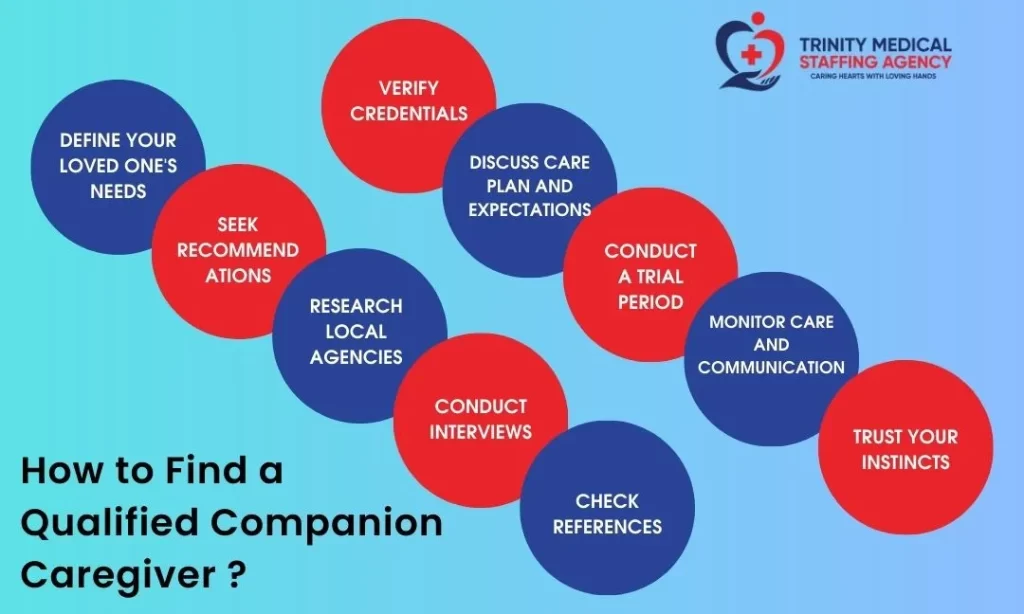
How Companion Care Can Enhance the Lives of Seniors
Aging is a remarkable journey, a chapter in life where wisdom and experience flourish. Yet, for many seniors, this stage can also bring moments of solitude and the need for extra support and companionship. That’s where the gentle embrace of companion care for seniors steps in – a service that not only enriches the lives of seniors but also nurtures their well-being in heartwarming ways.
Today we will delve into the world of companion care, unveiling the profound benefits it offers to seniors and their families and further we will see how to find a companion caregiver. Join us on this exploration of how companion care provides more than just assistance – it provides cherished moments, laughter, and the warm reassurance of a caring presence.
What is Companion Care?
Companion care is a specialized form of caregiving that focuses on providing emotional support, companionship, and assistance with daily activities for seniors who may be experiencing loneliness, isolation, or the challenges of aging. Unlike medical care, which addresses specific health issues, companion care is centered on enhancing the overall well-being and quality of life for seniors.
Companion caregivers, often referred to as “companion caregivers” or “companion aides,” offer valuable companionship and engage in meaningful activities with seniors. These caregivers are not typically trained to provide medical services but are skilled in providing emotional support and helping with various non-medical tasks.
Companion care services can be tailored to meet the unique needs and preferences of each senior. Whether it’s a few hours a day or around-the-clock support, companion caregivers are there to provide social interaction and assistance to seniors in the comfort of their own homes.
What Are the Benefits of Companion Care for Seniors?
Companion care offers a multitude of benefits that can significantly improve the lives of seniors. Let’s explore some of these advantages:
Alleviates Loneliness and Isolation: One of the most significant benefits of companion care is its ability to combat loneliness and isolation, which are common challenges among seniors. Companion caregivers provide regular social interaction, engage in conversations, and offer emotional support, helping seniors feel more connected and less isolated.
Enhances Mental Well-being: Engaging in stimulating conversations, playing games, or pursuing hobbies with a companion caregiver can contribute to better mental health for seniors. It helps keep their minds active, reduces feelings of depression and anxiety, and enhances cognitive function.
Promotes Physical Activity: Companion caregivers encourage seniors to stay physically active by engaging in light exercises, going for walks, or participating in activities that promote mobility. Regular physical activity is essential for maintaining overall health and preventing physical decline.
Assists with Daily Task: While companion caregivers primarily focus on providing companionship, they can also assist with non-medical tasks such as meal preparation, light housekeeping, medication reminders, and transportation to appointments or social outings. This support allows seniors to maintain their independence and age comfortably in their homes.

Enhances Quality of Life: Companion care services are designed to enhance the overall quality of life for seniors. By providing emotional support, reducing loneliness, and ensuring seniors are engaged in fulfilling activities, companion caregivers contribute to a happier, more enjoyable daily life.
Peace of Mind for Families: Companion care not only benefits seniors but also provides peace of mind for their families. Knowing that their loved ones have regular companionship and assistance with daily tasks alleviates family caregivers’ concerns and allows them to focus on their own responsibilities and well-being.
How Companion Care Can Enhance the Lives of Seniors
Companion care is a valuable resource that can significantly enhance the lives of seniors in multiple ways. Here are some of the key ways companion care enriches the daily lives of older adults:
Provide Companionship and Social Interaction
Loneliness and social isolation can take a toll on a senior’s emotional well-being. Companion caregivers are not just caregivers; they are friendly faces, attentive listeners, and companions who genuinely care. They engage in conversations, share stories, and provide the essential social interaction that seniors need to feel connected and valued.
Help Seniors Stay Active and Engaged
Staying active and engaged is vital for maintaining physical and mental health in seniors. Companion caregivers encourage and assist with activities that stimulate the mind and body. Whether it’s a leisurely stroll in the park, gardening, or working on a craft project, these activities keep seniors engaged, happy, and physically fit.
Assist with Daily Tasks and Activities
Seniors may encounter challenges with daily tasks that were once routine. Companion caregivers step in to provide the necessary support with activities such as meal preparation, light housekeeping, grocery shopping, and medication reminders. This assistance ensures that seniors can continue to live comfortably and independently in their own homes.
Provide Emotional Support and Reassurance
The aging process can bring about emotional challenges, including feelings of sadness, anxiety, or fear. Companion caregivers offer a compassionate presence, offering a shoulder to lean on and an empathetic ear to confide in. They provide emotional support and reassurance, helping seniors navigate the emotional ups and downs that can accompany aging.
Help Seniors Stay Independent and in Their Own Homes
Many seniors wish to age in the familiar and comfortable surroundings of their own homes. Companion care enables them to do just that by providing the necessary assistance and support. With a companion caregiver’s help, seniors can maintain their independence, dignity, and a sense of autonomy while receiving the care and companionship they need.
Incorporating companion care into a senior’s life can be transformative, promoting physical and emotional well-being, reducing feelings of loneliness and isolation, and providing practical assistance with daily tasks. This form of care is designed not only to meet the immediate needs of seniors but also to enhance their overall quality of life, ensuring they live their golden years to the fullest.
How to Find a Qualified Companion Caregiver
When it comes to finding a companion caregiver for your loved one, it’s essential to select a qualified and compassionate professional who can provide the best care and companionship. Here are some steps to help you find the right companion caregiver:

Define Your Loved One's Needs
Before you begin your search, assess your loved one’s specific needs and preferences. Consider factors like the level of care required, preferred daily routines, and any specific activities or interests your loved one has. This will help you narrow down your search criteria and find a caregiver who is the right fit.
Seek Recommendations
Reach out to friends, family members, and healthcare professionals for recommendations. They may have valuable insights or know of reputable companion caregivers or agencies. Personal recommendations can provide peace of mind and a trusted starting point for your search.
Research Local Agencies
Look for local home care agencies that specialize in companion care for seniors. These agencies typically have a pool of trained and vetted caregivers. Research their websites, read client reviews, and check their credentials to ensure they meet your standards for quality care.
Conduct Interviews
When you have a list of potential caregiver candidates or agencies, schedule interviews. During these interviews, ask about their qualifications, experience, and their approach to providing companionship and care. It’s essential to assess their personality and communication skills, as a good rapport with your loved one is crucial.
Check References
Request references from the caregiver or agency and follow up with them. Speaking with previous clients or families who have worked with the caregiver can provide valuable insights into their reliability, professionalism, and the quality of care they provide.
Verify Credentials
Ensure that the caregiver has the necessary qualifications and certifications, if applicable. While companion caregivers may not require medical training, they should have training and experience in providing companionship and assistance with daily activities.
Discuss Care Plan and Expectations
Clearly communicate your loved one’s needs, preferences, and expectations with the caregiver. Discuss the care plan, daily routines, and any specific activities or tasks that are important. Make sure the caregiver is willing and capable of providing the level of care your loved one requires.
Conduct a Trial Period
Consider a trial period where the caregiver works with your loved one for a short time to ensure compatibility. This allows you to assess how well they connect with your loved one and whether they can provide the desired companionship and care.
Monitor Care and Communication
Once you’ve selected a caregiver, maintain open lines of communication. Regularly check in with your loved one to ensure they are comfortable and satisfied with the care provided. Effective communication is key to a successful caregiving relationship.
Trust Your Instincts
Finally, trust your instincts. If you feel that a particular caregiver is the right fit and provides the level of care and companionship your loved one needs, go with your gut feeling.
Finding a qualified companion caregiver may take time, but it’s worth the effort to ensure your loved one receives the best possible care and companionship. A dedicated companion caregiver can significantly enhance your loved one’s quality of life and provide the emotional support and social interaction they need as they age.
Embracing Companion Care for Seniors
Companion care is not just a service; it’s a way to enrich the lives of seniors and improve their overall well-being. By providing companionship, encouraging engagement, assisting with daily tasks, offering emotional support, and promoting independence, companion caregivers become valuable allies in the journey of aging gracefully.
In your search for the perfect companion caregiver, prioritize your loved one’s comfort, happiness, and safety. With the right caregiver by their side, they can enjoy their golden years with dignity, joy, and the companionship they deserve.
Trinity Home Care Agency provides companion care services in Arizona. Our caregivers are trained to provide companion care with compassion, understanding, and dedicated support. With Trinity’s holistic companion caregiving service, the journey towards enhanced quality of life for your seniors begins. If you also have senior loved ones at home, the best decision you can make is to provide them with the companionship and care they need to thrive in their later years.
You can get in touch with Trinity’s support team through our email and helpline number.
With the help of our team of experienced and qualified experts in international staffing, we will manage your needs from initial contact to the final contract.




